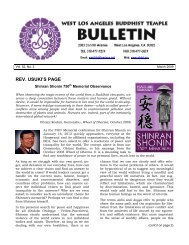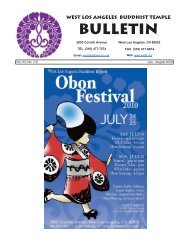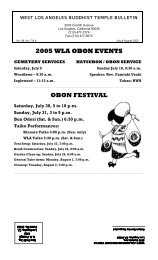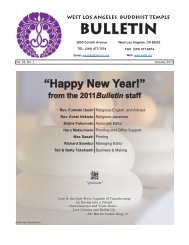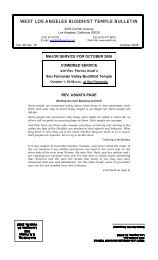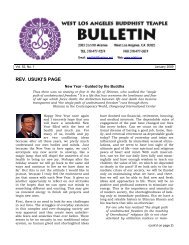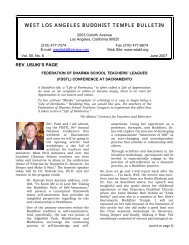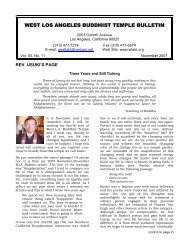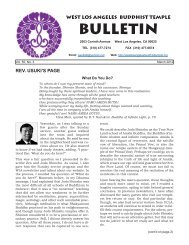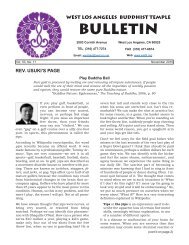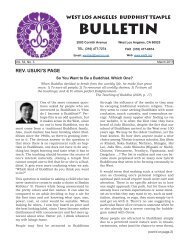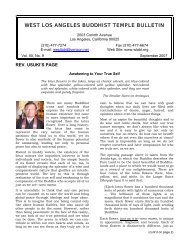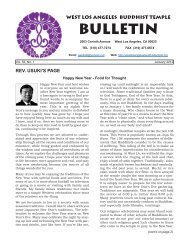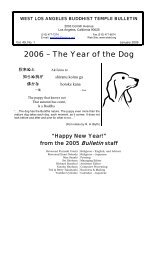2008 September Bulletin - West Los Angeles Buddhist Temple
2008 September Bulletin - West Los Angeles Buddhist Temple
2008 September Bulletin - West Los Angeles Buddhist Temple
You also want an ePaper? Increase the reach of your titles
YUMPU automatically turns print PDFs into web optimized ePapers that Google loves.
<strong>West</strong> <strong>Los</strong> <strong>Angeles</strong> <strong>Buddhist</strong> <strong>Temple</strong> <strong>September</strong> <strong>2008</strong><br />
Jeff Wilson<br />
Since 2002, I’ve been conducting<br />
a research study at<br />
the Ekoji temple in Richmond,<br />
Virginia. This isn’t<br />
the Ekoji in northern Virginia<br />
that some of you may<br />
have heard about. Rev. Tsuji,<br />
the former bishop of the<br />
BCA, started both Ekojis but the Richmond<br />
temple is not really a Jodo Shinshu temple. Rather,<br />
it is multi-denominational, with five different<br />
kinds of <strong>Buddhist</strong> groups meeting under<br />
one roof. One of them is a Pure Land group<br />
which includes some Shin elements, such as<br />
Juseige, but it is not a full-fledged Jodo Shinshu<br />
group. The others are Zen, Tibetan, Vipassana<br />
(a type of Theravada), and a quasi-Zen<br />
meditation group.<br />
I was fascinated when I first heard about all of<br />
this activity going on in one temple. This is a<br />
very unusual situation: in Japan and elsewhere,<br />
usually only one type of Buddhism would be<br />
found in each temple. For example, when we<br />
visit Hongwanji in Kyoto, we don’t expect to find<br />
a group practicing Tibetan tantra or people<br />
organized to do Zen meditation. This group in<br />
Richmond developed because people in America<br />
don’t have access to the same sort of resources<br />
that people in Asia do: even though Buddhism<br />
has been here over 100 years, in many parts of<br />
the country it is still new and unusual, and<br />
different kinds of Buddhism have to stick together<br />
in order to gather enough people and<br />
funds for a temple.<br />
Trying to practice Buddhism in a new place like<br />
Richmond presents many challenges. At the<br />
same time, there are some advantages too. Because<br />
they have so many kinds of Buddhism in<br />
the same temple, they are able to learn about<br />
many different Dharma paths. Often, people<br />
start with one group, and they don’t know much<br />
about other kinds of Buddhism. They may have<br />
bad ideas about unfamiliar types of Buddhism:<br />
for example, if they practice Zen they may think<br />
that Pure Land is a useless sort of Buddhism, or<br />
if they practice Tibetan they may think Zen is a<br />
deviation from the Buddha’s teachings. If they<br />
were isolated, it would be easy for them to think<br />
only about their particular sect and disparage<br />
other kinds of Buddhism out of ignorance. But<br />
because they are all together, eventually they<br />
begin to learn about each other. People from the<br />
Zen group sometimes visit the Pure Land group<br />
3<br />
and learn about it, and people from the Tibetan<br />
group sometimes participate in the Vipassana<br />
group. Also, they meet together several times<br />
per year, such as at Buddha’s Birthday (Hanamatsuri).<br />
Then they can practice together as one<br />
Sangha and appreciate the richness of the<br />
Dharma.<br />
Even though they interact with each other, most<br />
people have chosen the path that suits them<br />
best and spend the majority of their time on one<br />
practice, be it nembutsu, zazen, or something<br />
else. They may blend their practices a little, but<br />
they still remain true to one school of Buddhism.<br />
Thus they find ways to go deeply into one practice<br />
while also learning about others and coming<br />
to appreciate the variety within Buddhism. This<br />
is the sort of advantage that Americans have in<br />
Buddhism. Even if we are dedicated to one path,<br />
we have the opportunity to learn about others<br />
and discover how people in many parts of the<br />
world live the Buddha’s teachings. We don’t<br />
have to live in Richmond in order to experience<br />
it. <strong>Los</strong> <strong>Angeles</strong> is the most diverse city for Buddhism<br />
on the planet (it’s true!), and we can find<br />
many other kinds of <strong>Buddhist</strong> practice going on.<br />
Sometimes there are other kinds of Buddhism<br />
right around us and we don’t know it: I remember<br />
dancing at Obon at the Betsuin, and there<br />
were not only people from the many Shin temples<br />
in Southern California, but also Zen <strong>Buddhist</strong>s,<br />
Shingon <strong>Buddhist</strong>s, Nichiren <strong>Buddhist</strong>s,<br />
and people connected to Tibetan, Burmese, and<br />
other kinds of Buddhism. Perhaps we don’t<br />
have the same sort of advantages that people in<br />
Japan do, but at the same time we also have<br />
some unique opportunities that we can be<br />
thankful for.<br />
<br />
Jeff sends his “Hello!” to everyone at WLA<br />
and encloses a recent photo of his son, Tai.



